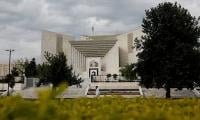Karachi
The Awami National Party, since suffering a drubbing in the 2013 general elections when it could win a single seat in Karachi’s Pashtun-populated constituencies, has continuously been on a downward journey in the city.
The recent local government polls too proved to be a disaster for the ANP, which only managed to win one of the 209 seats in the city on its own electoral symbol, a lantern.
The sole constituency won by the ANP in the elections is the West district’s Mominabad union committee, where party candidate Alamzaib Alai won the slot of the chairperson after forming an electoral alliance with the Jamiat Ulema-e-Islam-Fazl (JUI-F), which secured the seat of the vice chairperson.
The party, after forging an electoral alliance with the Pakistan People’s Party, also won the vice chairperson seat in the South district’s Civil Lines union committee.
Younas Buneri, the ANP Sindh general secretary, said his party had also secured five vice chairperson seats and several councillor slots, mainly in electoral alliances with other parties, especially the Pakistan People’s Party and the JUI-F, using other electoral symbols.
The ANP convened a meeting on Thursday of its think tank and candidates who had contested in the local government polls in Karachi and discussed the reasons for the party’s failure in the elections.
The participants of the meeting decided to reorganise the party in the city in line with the new local government constituencies and the candidates who ran in the polls would be assigned this task, the party said in a statement issued on Friday.
Factors behind the failure
The ANP, in most of the union committees, participated in the local government polls by forming alliances with the Pakistan People’s Party and the JUI-F.
However, the local government polls results show that the Pakistan Tehreek-e-Insaf, the Jamaat-e-Islami, the Pakistan Muslim League-Nawaz, and the Pakistan Rah-e-Haq Party (PHRP), the Ahle Sunnat Wal Jamaat’s political front, are the parties that have succeeded in the city’s Pashtun neighbourhoods.
ANP leaders said the party was the only one in recent local government elections and 2013 general polls which had faced the brunt of Taliban attacks.
“Because of security threats, the ANP had fielded its candidates as independent ones instead of using the party’s electoral symbol,” Buneri told The News.
Over 100 party leaders and activists have been killed by the Tehreek-e-Taliban Swat chapter in Karachi, mainly in the West district.
“After a recent attack on Rangers in Ittehad Town, the law enforcement agencies, instead of providing security to the ANP, only warned that the Taliban group involved in the attack might also target our party leaders and rallies,” said Buneri.
“We were busy in protecting our cadres from militant attacks while rival parties, especially the central leaders of the PTI and the JI, were freely visiting Pashtun neighbourhoods,” he added.
“Taliban militants don’t target these two parties because of their pro-Taliban policies.” However, analysts and leaders of rival political parties said Pashtun voters had expressed their dissatisfaction with the ANP because of its poor performance, involvement in ethno-political violence and introducing extortion culture in their neighbourhoods.
In SITE Town, the PTI-JI alliance has secured most of the seats. In Keamari, the PTI has emerged as a key political party. In Malir’s Pasthun areas, the PML-N and the PHRP have won most of the seats.
Hajat Khan, a PTI leader who has been elected chairperson in the Frontier Colony union committee, a constituency where ANP central leader Amir Nawab had won in the local government polls in 2001 and 2005 and a Sindh assembly seat in 2008, said Nawab was in power from 2001 to 2013 as the nazim of SITE Town and the provincial labour minister, but had not carried out any development project in his constituency.
“My victory shows that the ANP lost its influence among Pashtuns,” Khan told The News. “In last decade, the ANP pushed Pashtuns into isolation while the PTI has been bringing them back in the mainstream in Karachi.”
ANP and city’s politics
Political analysts, who monitor the politics of the Pashtun population in Karachi, believe that on the electoral front, the city’s Pashtuns have never acted like an ethnic group and traditionally aligned themselves with various political and religious parties, mainly the ANP, the PPP, the JUI-F, the JI, and recently, the PTI. The sectarian Ahle Sunnat Wal Jamaat too has tried to build a support base in the city’s Pashtun community.
Karachi’s Pashtun votes are heavily influenced by the trends in Khyber Pakhtunkhwa. Following the voters trend in there, Karachi’s Pashtuns voted for the Muttahida Majlis-e-Amal, a nation-wide electoral alliance of six religious parties, mainly the JUI-F and the JI, in the 2002 general polls, the ANP in the 2008 general polls and the PTI in the 2013 general polls.
However, a section of analysts say that Karachi’s Pashtuns, since 1987, have voted for independent Pashtun individuals in the local government polls and never opted for the ANP.
Manan Baacha, a political analyst who writes in Pastho monthly “Leekwal”, said even in 1987, when the ANP was enjoying support among Sindhis and Baloch too, Karachi’s Pashtuns had not voted for it.
Justifying his argument, Baacha said in the defunct SITE Town, a Pashtun-majority area having nine UCs, only Nawab, who joined the ANP in the same year, had won a UC and later, he was elected town nazim because of his alliance with the PPP and the PML-N and the MQM boycotting the polls. In the 2005 local government polls, the ANP had only won the same seat.
The ANP had won two Sindh Assembly seats in 2008 general polls because of its alliance with the PPP and the formation of the Pashtun Action Committee, also known as the Loya Jirga, he said.
“Karachi’s Pashtuns disapprove of the ANP because of its ambiguous politics,” Baacha told The News.
“It doesn’t focus on the community’s issues including water shortage in Pashtun areas, denial of the national identity cards issuance to the community’s members and harassment at the hands of the law enforcement agencies. These factors cause disconnect between the party and the community.”
Baacha said in comparison, leaders of rival parties, including JI chief Sirajul Haq, visited Pashtun neighbourhoods and assured the community that their issues would be raised with the authorities concerned.
The image shows a tobacco company worker holding cigarettes. — AFP/FileHYDERABAD: An illegal cigarette factory...
This image shows the dead body. — AFP/FileAn incident unfolded in Quaidabad on Tuesday, resulting in one fatality...
Edhi Marine Services team is busy in a rescue operation in Karachi on March 17, 2024. — PPI An e-taxi driver...
Shah Abdul Latif University Khairpur building can be seen in this image. — Facebook/Shah Abdul Latif University,...
Representational image of a handcuffed man. — Pexels/FileHYDERABAD: A police operation was carried out in Hyderabad,...
A representational image showing a person handcuffed and standing behind bars. — AFP/FileThe SSGC has continued...







